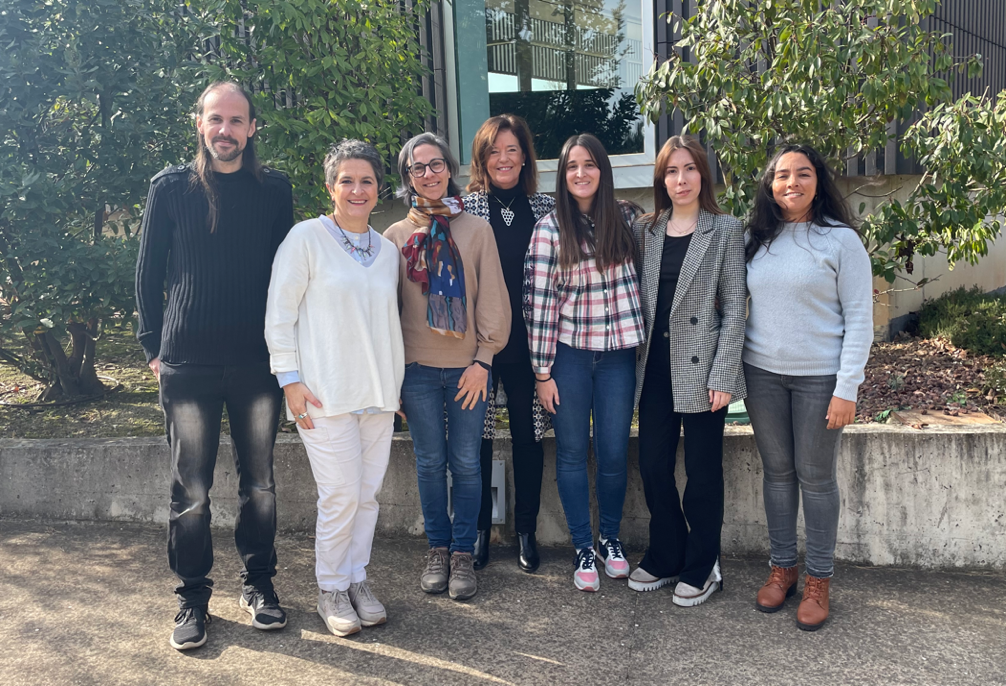
The group has a clear multidisciplinary character, and its main activity is the grape and wine research, from physicochemical (phenolic and volatile fractions) and sensory properties, to the study of the biological effects of moderate consumption of wine and its polyphenols on health in the context of a healthy diet. The specific aims are grouped in different research lines, as detailed below:
Activity 1. Study of the minority fractions, responsible for grape and wine quality. This activity includes different sub-activities:
- 1.1. Analysis of the volatile composition (aromatic quality) of grapes and wine, by gas chromatography coupled to mass spectrometry (GC-MS).
- 1.2. Analysis of grape and wine phenolic fraction using advanced liquid chromatography techniques: targeted metabolomics (UHPLC-QqQ-MS/MS) and untargeted metabolomics (UHPLC-qToF).
- 1.3. Sensory characterization of grapes, wines and distillates. Correlations between chemical composition and sensory descriptors. To develop new methods of sensory analysis of grapes and other fruits.
This activity line is open to any vegetable product such as virgin olive oil, fruit, cereals and hops, and others, as well as by-products from the food industry.
Activity 2. New tools to analyze the crop quality. Application UV/VIS/NIR/MIR spectroscopy technique. Use of chemometrics data in correlation with UV/VIS/NIR/MIR spectroscopy images for fruit quality evaluation and estimation of water and nutritional status of the crops. This research line is developed in collaboration with Queensland University.
Activity 3. Grape response to biotic and abiotic stresses. Improve the grape and wine quality by a controlled stress in the plant and post-harvest, stimulating glycosylated forms and phenolic compounds. Study of volatile compounds as defense responses against stress.
Activity 4. Vineyard and post-harvest ozone application. Ozone impact evaluation on minority fractions of grapes and wine (volatile and phenolic fractions).
Activity 5. Wine, Polyphenols and Health. This line of research is developed in collaboration with different Institutions in the Biomedical and Clinical fields. Its main objective is focused on the study of the mechanisms of the healthy properties of wine polyphenols, through moderate consumption and in the context of the Mediterranean Diet. One of the main objectives of this activity is focused on the identification of biomarkers of wine consumption in particular and diet in general, through the application of advanced techniques of directed and undirected metabolomics, applied to the analysis of biological samples of different nature (urine, plasma/serum, feces, saliva and tissues).
- 5.1. Targeted Metabolomics: High Performance Liquid Chromatography Coupled with Tandem Mass Spectrometry (UHPLC-QqQ-MS/MS). Study of the bioavailability and biological metabolism of dietary polyphenols, with special interest in wine, through the identification and quantification of their metabolites in biological samples. Application in in vitro digestion models, cell lines, animal model and human studies.
- 5.2. Non-targeted metabolomics: High-performance liquid chromatography (HPLC-DAD-ESI/APCI/ASAP-HRMS/MS) coupled to high-resolution quadrupole/TOF mass spectrometry (qToF) combined with multivariate analysis to study pathway modulation metabolic. Application in epidemiological or nutritional intervention studies. Application to the study of diet-intestinal microbiota interactions.
- 5.3. Analysis of short chain fatty acids (SCFA) and TMAO in biological samples. Application to the study of diet-intestinal microbiota interactions.
Activity 6. Valorization of by-products (skins, seeds and stems) from the winemaking process to obtain new ingredients with high content of bioactive compounds, with special interest in polyphenols, and their application in the formulation of new foods. This research line is open to crops protection application and new packaging materials.
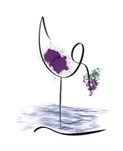 Active Research Projects
Active Research ProjectsProject title: "Development and validation of a digitized information system for the comprehensive evaluation of eating habits in population groups (integrALIMENTA).”
Contact Researcher: Mª José Motilva
Financing entity: Ministerio de Ciencia e Innovación. PDC2022-133861-C22. Convocatoria “prueba de Concepto”-2022 (Plan de Recuperación, Transformación y Resiliencia)
Participants: Instituto de Ciencias de la Vid y del Vino-ICVV, CIBIR-Fundación Rioja Salud.
Coordinated project: CIAL (CSIC, UAM), Madrid; Instituto de Física de Cantabria (CSIC, UC)
Duration: 01/11/2022 – 30/10/2024
Global objective: This project's final objective is the digitalization, through the development of an App, of surveys to collect data on the population's eating habits, with a special interest in their application for wine consumption studies. It is intended that the structure of the App tool allows its widespread use in different areas, from the scientific to the clinical field, the hospitality field, to the consumer. With this objective, digitalized tools will be developed to generate databases that allow individual monitoring of the dietary pattern and nutritional profile of each individual. These tools will integrate a series of image recognition algorithms, developed within the framework of the project, using artificial intelligence (AI) tools, to estimate the volume of wine. These models will also be developed to estimate the weight of the serving of other foods of interest, such as fruits and red meat. The purpose of the project is to transfer to end users, researchers and health professionals, as well as companies, and consumers in general, an App that helps improve the population's eating habits, as well as a precise evaluation. of dietary patterns, with special interest in its application to studies of wine consumption habits.
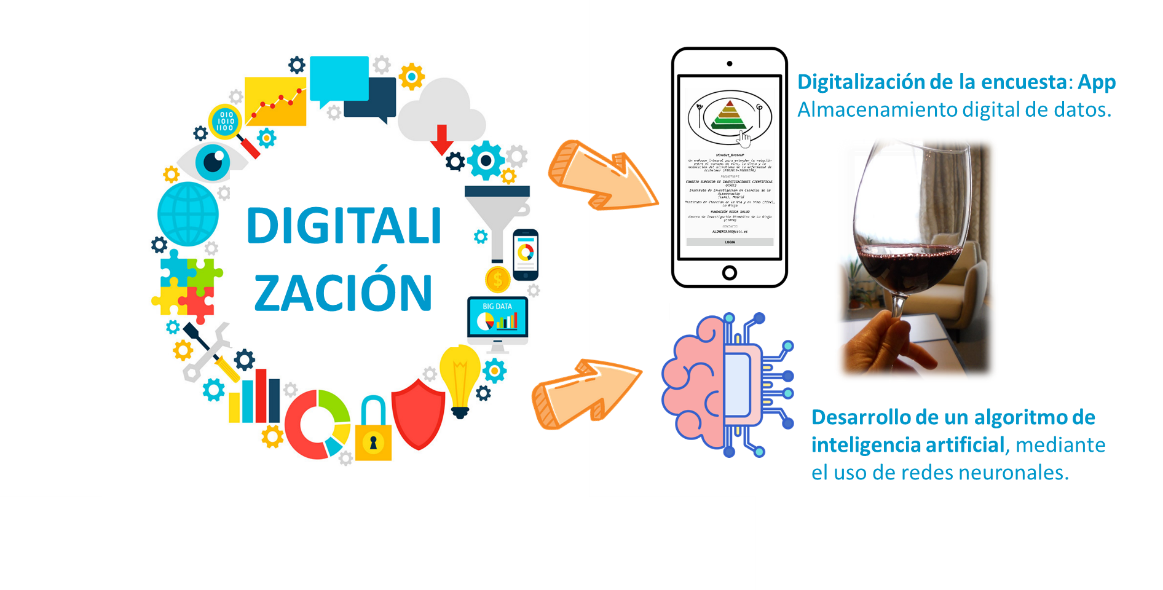
Project title: "Moderate red wine consumption on Alzheimer's disease and brain function.”
Contact Researcher: Mª José Motilva
Financing entity: FIVIN (Fundación para la Investigación del Vino y la Nutrición). Convocatoria proyectos 2022 “Vino, Nutrición y Salud”.
Participants: CIBIR-Fundación Rioja Salud, Instituto de Ciencias de la Vid y del Vino-ICVV, CIAL (CSIC, UAM), Madrid
Duration: 2023 – 2024
Global objective: This project has been one of the three winning projects of the first edition of research grants from the Foundation for Research on Wine and Nutrition (FIVIN) in 2022. In this first call, 20 proposals from universities and research centers from Spain. The objective of this initiative, which has the support of the Spanish Wine Interprofessional (OIVE), is to promote research and scientific studies that address, from the nutritional and epidemiological point of view, the biological effects of moderate wine consumption and its components on health in a healthy eating. The objective of this project is to advance in the study of the mechanisms responsible for the protective effect of moderate consumption of red wine in the early stages of Alzheimer's disease or mild cognitive impairment, as a strategy to slow down or reverse cognitive impairment, always within the context of moderate consumption and within the framework of a healthy diet.
Project title: "Relationship between wine consumption, diet and microbiome modulation in Alzheimers Disease in a cohort from La Rioja.”
Contact Researcher: Mª José Motilva
Financing entity: Ministerio de Ciencia e Innovación. PID2019-108851RB-C22
Participants (Coordinated project): CIAL-CSIC, Madrid; Instituto de Ciencias de la Vid y del Vino-ICVV, CIBIR-Fundación Rioja Salud.
Duration: 01/06/2020-30/05/2024
Global objective: The subproject aims to precise the connections between diet, and wine in particular, and protection against Alzheimers disease (AD) in an environment of other multiple lifestyle factors. A first specific objective is focused on the development of tools for characterizing lifestyle factors potentially associated with AD, in particular an app mobile application prototype for the self-report of diet and lifestyle habits, and especially for wine consumption, in a simple and user-friendly manner. In a second objective and as main focus of the subproject, we will study the dietary and lifestyle factors associated with prevalent subclinical Alzheimer's disease in La Rioja cohort, with special attention to the wine consumption, and microbiota and metabolic features. In the third objective, the subproject will be focused on animal-based investigations about the mechanisms of the protective effects against AD of moderate wine consumption in relation to the modulation of intestinal microbiota. For this proposal, an AD-induced mice model will be used to specifically explore the modulation effects of wine/wine polyphenols on gut microbiota through the fecal microbiota transplantation.
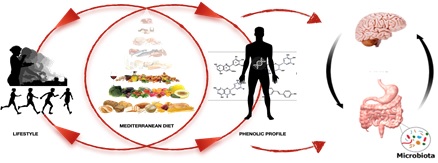
Project Title: “Annual water and agronomic management in red grape varieties to improve their productive and qualitative behavior and reduce effects of climate change (WFW-Irrivitis)”
Contact Researcher: Mar Vilanova
Financing entity: Ministerio de Ciencia e Innovación, PID2019-105039RR-C44
Participants (Coordinated project): Cicitex (Extremadura), Fundescam (Castilla-La Mancha), Itacyl (Castilla y León), Universidad de Santiago de Compostela (Galicia), Instituto de Ciencias de la Vid y del Vino (Logroño)
Duration: 2020-2023
Sub-project from Galicia (USC-ICVV): Effects of the irrigation frequency and the use of slate waste in the production and quality of Vitis vinifera cv. Mencía: aromatic composition.
Global objective: Galician vineyards have not been traditionally irrigated, although in the last decade it has had an increase in irrigated surface with the aim of addressing the inter-annual irregularity of the productions, seeking a stabilization in quality and production. Another aspect that justifies the implementation of irrigation systems has been climatic alterations, especially the decrease in rainfall during the summer period and its irregularity, together with slight increases in temperatures. Although there are several studies about the irrigation management in Galician vineyards, in red varieties are limited, being necessary to expand knowledge about when, and how much water apply to improve the efficiency in the use of water, without reducing the quality of grapes. Since the majority red variety in Galicia is Mencía, which accounts for more than 90 % of the surface of the Galician red varieties, the study will be carried out on it. In addition, it is necessary to make progress in the control of vegetation along the vineyard line, since the climatic conditions in Galicia favor its presence, competing for the resources available to the vineyard. Beyond solutions based on agronomic practices such as chemical synthesis herbicides, compost, organic mulch, and/or soil tillage, with significant annual costs of raw materials and labor, as well as environmental problems (erosion and soil contamination, resistance generation), inorganic mulches are presented as an alternative. Despite the scarcity of studies on the use of inorganic mulch to control weeds in vineyards, waste from slate mines in Galicia have physicochemical characteristics that make mining waste a possible material to control vegetation. on the line of the vineyard. The problems of irrigation management and weed control in the Mencía variety have led to a field trial with two study factors: irrigation frequency and inorganic mulch based on slate residues.
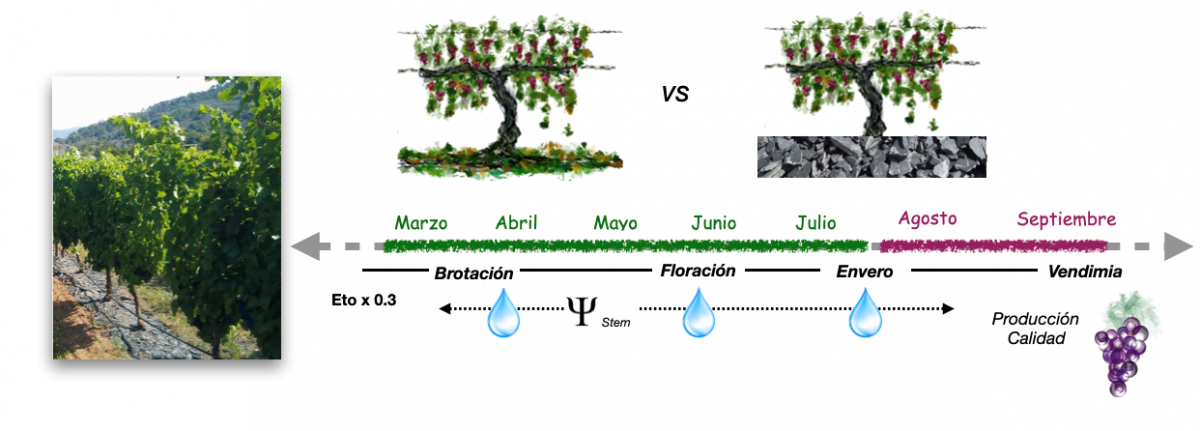
Project Title: “Agronomic and oenological evaluation of ozone treatment in Ribeira Sacra varieties to enhance the aromatic and phenolic composition of wines from Ponte da Boga winery”
Contact Researcher: Mar Vilanova
Financing entity: Centro para el Desarrollo Tecnológico Industrial (CDTI) and Ponte da Boga winery (Galicia)
Participants: Ponte da Boga winery (Galicia), Universidad de Santiago de Compostela (USC), Instituto de Ciencias de la Vid y del Vino (ICVV) y Universidad de Turín
Duration: 2021-2023
Global objective: The application of post-harvest ozone has been studied by different researchers with the aim of reducing the use of antimicrobials such as sulfur dioxide (SO2) and thus minimizing its effects on health and the quality of aroma in wines. However, there are few studies on its effects on the grapes and wine quality. The existing studies to date suggest that postharvest ozone causes a positive effect on the accumulation of volatile and phenolic compounds and changes in secondary metabolites due to biochemical, genetic or transcriptomic defense mechanisms. In this sense, the objective of this project is to determine the agronomic response of wine varieties Albariño, Godello, Blanco lexítimo and Mencía in the edaphoclimatic conditions of different subzones of the D.O. Ribeira Sacra (Galicia) and to evaluate the effect of the ozone application in post-harvest on the grape and wine phenolic and aromatic quality. Finally, the effect of ozone on wines sensory profiles is also evaluate.

Project title: “Use of by-products and development of the Circular Economy of the Agrifood Industry” (plusPRODUCT). Project reference: 23M/20
Contact Researcher: Mª José Motilva
Program: Línea Ayudas para los equipos de innovación que planteen acciones conjuntas con vistas a la mitigación o adaptación al cambio climático. Convocatoria 2020. Fondo Europeo Agrícola de Desarrollo Rural: Europa invierte en las zonas rurales..
Financing entity: Unión Europea (Fondo Agrícola De Desarrollo Rural); Ministerio de Agricultura, Alimentación y Medioambiente; Gobierno de La Rioja
Participants: AIDISA-CENTRO TECNOLÓGICO ALIMENTARIO Ctic Cita, La Rioja (coordinator); Consejo Superior de Investigaciones Científicas (CSIC), Instituto de Ciencias de la Vid y del Vino (ICVV)
Duration: 09/2020-08/2021
Global objective: The problem of waste generation, together with the potential for valorization of winemaking by-products and tomato transformation, as a source of bioactive compounds with high added value, have justified the PlusProduct project. Within the framework of the project, the application of different technologies for the conservation of by-products (skin, seeds and stem) has been prioritized for the generation of new ingredients, which entails the reduction of waste within the concept of "circular economy". From the ingredients obtained, different products based on pasta and tomato sauce have been formulated as the first "proof of concept" that has allowed the establishment of a methodology for obtaining ingredients with high added value for the formulation of new, healthier and more nutritious foods. with new flavors and differentiated appearance. Another of the future applications of the ingredients obtained within the framework of the project will focus on the application as bioprotectors for the search for solutions to improve agricultural productivity, more sustainable and respectful with the environment.
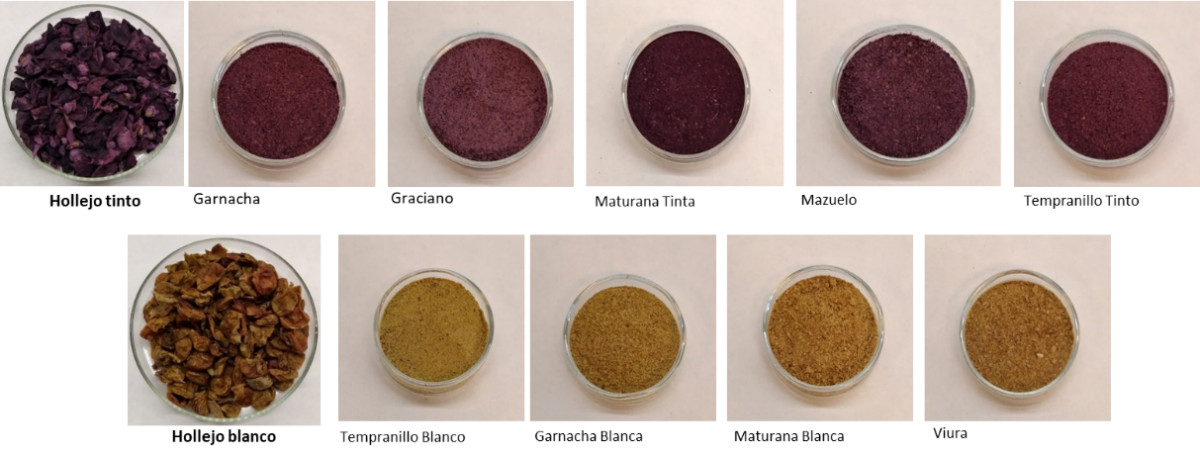
Project title: “Analysis of phenolic metabolites derived from colonic fermentation of wine, by means of high resolution liquid chromatography coupled with mass spectrometry (UHPLC-QqQ-MS/MS)."
Contact researcher: Mª José Motilva
Participants: Contrato de Apoyo Tecnológico entre La AGENCIA ESTATAL DEL CONSEJO SUPERIOR DE INVESTIGACIONES CIENTÍFICAS (CSIC) y AINIA (Paterna, Valencia)
Duration: 2021-2022
- Unidad de Investigación de Enfermedades Infecciosas, Microbiota y Metabolismo del Centro de Investigación Biomédica de La Rioja (CIBIR, Fundación Rioja Salud). Enlace a la Unidad Asociada
- CropQuality: Estreses en los cultivos y sus efectos en la calidad (Universidad de Santiago de Compostela).Enlace a a la Unidad Asociada
María José Motilva
https://orcid.org/0000-0001-8985-7737
Scopus Author ID: 6701753466
Mar Vilanova
https://orcid.org/0000-0002-1417-9537
Scopus Author ID: 12766701400
Motilva, M-J.; Soldevilla Muro, G. (2023). Valorización de subproductos y bioeconomía circular. Cuaderno de Campo (Gobierno de La Rioja; Consejeria de Agricultura, Ganadería, Mundo rural y Medio Ambiente). Numero 69: 29-33
Souza da Costa, B.; Soldevilla-Muro, G.; Oliván García, M.; Motilva, M-J. (2023). A comparative evaluation of the phenol and lycopene content of tomato by-products subjected to different drying methods. LWT – Food Science and Technology, 179: 114644. https://doi.org/10.1016/j.lwt.2023.114644
Alencar, A.C.; Pereira, R.; dos Reis, M.; Douglas, W.; Lúcio, M.; das Graças, M.; Vilanova, M.; Ferreira, W. (2022). Production and characterization of a new distillate from green coffee seed residue. Food Chemistry, 377: 131960. https://doi.org/10.1016/j.foodchem.2021.131960
Calderón-Martín, M.; Valdés-Sánchez, E.; Alexandre-Franco, MF.; Fernández-González, MC.; Vilanova M.; Cuerda-Correa, E.M.; Gómez-Serrano, V. (2022). Waste valorization in winemaking industry: Vine shoots as precursors to optimize color and aroma in white wine. LWT-Food Science and Technology 163 (2022) 113601. https://doi.org/10.1016/j.lwt.2022.113601
Cobo, M.; Heredia, I.; Aguilar, F.; Lloret, L.; García, D.; Bartolomé, B.; Moreno-Arribas, M.V.; Yuste, S.; Pérez-Matute, C.P.; Motilva, M-J. (2022). Artificial Intelligence to estimate wine volume from single-view images. Heliyon, 8: e10557. https://doi.org/10.1016/j.heliyon.2022.e10557
Souza da Costa, B.; Soldevilla-Muro, G.; Oliván García, M.; Motilva, M-J. (2022). Winemaking by-products as a source of phenolic compounds: Comparative study of dehydration processes. LWT – Food Science and Technology, 165: 132612. DOI: https://doi.org/10.1016/j.lwt.2022.113774
Valdés, E.; Talaverano, MI.; Moreno, D.; Mancha, LA.; Vilanova, M. (2022). Changes in phenolic composition of Tempranillo by effect of abiotic stresses in the vineyard. Plants 11, 1393. https://doi.org/10.3390/plants11111393
Royo, C.; Ferradás, Y.; Martínez-Zapater, J.M.; Motilva, M-J. (2021) Characterization of Tempranillo negro (VN21), a high phenolic content grapevine Tempranillo clone, through UHPLC-QqQ-MS/MS polyphenol profiling. Food Chemistry, 360: 130049. https://doi.org/10.1016/j.foodchem.2021.130049
Bars-Cortina, D.; Sakhawat, A.; Piñol-Felis, C.; Motilva, M-J. (2021) Chemopreventive effects of anthocyanins on colorectal and breast cancer: A review. Seminars in Cancer Biology. DOI: https://doi.org/10.1016/j.semcancer.2020.12.013.
Royo, C.; Carbonell-Berejano, P.; Torres-Pérez, R.; Freire, L.; Ibáñez, J.; Martínez-Zapater, J.M.; Vilanova M. (2021). Is aromatic terpenoid composition of grapes in Northwestern Iberian wine cultivars related to variation in VviDXS1 gene?. Journal of Berry Research, 11(2): 187-200. DOI: https://doi.org/10.3233/JBR-200609
Vilanova, M.; Genisheva, Z.; Tubío, M.; Alvarez, K.; Lissarrague, J.R.; Oliveira, J.M. (2021). Effect of nine rootstocks on chemical and volatile composition of Albariño wine. Applied Science, 11, 2135. DOI: https://doi.org/10.3390/app11052135
Coelho, E.; Lemos, M.; Genisheva, Z.; Domingues, L.; Vilanova, M.; Oliveira, J.M. (2020). Simple and quick LLME/GC-MS methodology to quantify minor volatile compounds in alcoholic beverages. Molecules, 25:621. DOI: https://doi.org/10.3390/molecules25030621
Daimiel, L.; Micó, V.; Valls, R.M.; Pedret, A.; Motilva, M.J.; Rubió, L.; Fitó, M.; Farrás, M.; Covas, M.I.; Solá, R.; Ordovás, J.M. (2020) Impact of Phenol-Enriched Virgin Olive Oils on the postprandial levels of circulating microRNAs related to cardiovascular disease. Molecular Nutrition and Food Research, 64, 2000049. doi: https://doi.org/10.1002/mnfr.202000049
Moreno-Arribas, M.V.; Bartolomé, B.; Peñalvo, J.L.; Pérez-Matute, P.; Motilva, M-J. (2020) Relationship between Wine Consumption, Diet and Microbiome Modulation in Alzheimer’s Disease. Nutrients, 12, 3082. doi: https://doi.org/10.3390/nu12103082
Vilanova, M.; Fernández, E.; Yuste, J. (2020). Abiotic stresses influence on Verdejo wine composition: Cluster thinning on different water regimes. Journal of the Science of Food and Agriculture, 100:1515-1523. DOI: https://doi.org/10.1002/jsfa.10159
